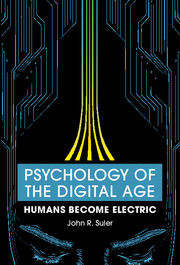Book contents
- Frontmatter
- Dedication
- Contents
- List of Figures
- Foreword
- Preface
- Acknowledgments
- Introduction: Newborns in Evolution
- 1 Cyberpsychology Architecture
- 2 Presence: Be Here Now
- 3 The Dynamic Digital Psyche
- 4 The Disinhibited Self
- 5 Electrified Relationships
- 6 Other Than You Think: Interpersonal Perceptions
- 7 Text Talk
- 8 Image Talk
- 9 I, Avatar
- 10 One of Us: Groups and Communities
- 11 Change and Excess
- 12 Addicted or Devoted
- 13 The Digital Deviant
- 14 Synthesized Realities and Synthesized Beings
- 15 Electric Th erapeutics
- Conclusion: Research and the Researcher
- References
- Index
1 - Cyberpsychology Architecture
Published online by Cambridge University Press: 05 November 2015
- Frontmatter
- Dedication
- Contents
- List of Figures
- Foreword
- Preface
- Acknowledgments
- Introduction: Newborns in Evolution
- 1 Cyberpsychology Architecture
- 2 Presence: Be Here Now
- 3 The Dynamic Digital Psyche
- 4 The Disinhibited Self
- 5 Electrified Relationships
- 6 Other Than You Think: Interpersonal Perceptions
- 7 Text Talk
- 8 Image Talk
- 9 I, Avatar
- 10 One of Us: Groups and Communities
- 11 Change and Excess
- 12 Addicted or Devoted
- 13 The Digital Deviant
- 14 Synthesized Realities and Synthesized Beings
- 15 Electric Th erapeutics
- Conclusion: Research and the Researcher
- References
- Index
Summary
Technology is the knack of so arranging the world that we don't have to experience it.
– Max FrischYears ago I came across an advertisement from Tidal Wave Communications that introduced a new computer accessory called Orecchio. It was a headset, using the Telepathic Internet Data Exchange (TIDE) protocol, that enhanced email functionality by enabling you to send your most important thoughts directly from their source: your mind. “Imagine no more keyboards and achy hands. No more eye strain from the glare of the screen. Just visualize the message you want to send, followed by your send command, and poof! Your email is transmitted to our network for quick delivery to its destination.” Enticed by the opportunity to connect my brain directly to the machine, I would have adopted Orecchio without hesitation, if not for the fact that the advertisement was, of course, an April Fools’ joke. The telepathic headset was bogus, but not my realization that truth once again comes out in jest: our minds extend into cyberspace. Years later, research into brain-to-computer and brain-to-brain interfaces suggested that we might indeed control computers with just our minds and perhaps even communicate very simple thoughts and feelings directly between each other's brains via the machine.
CYBERSPACE IS PSYCHOLOGICAL SPACE
True to the literal definition of psychology as the study of the psyche or mind, cyberpsychology is the study of the cyber-psyche, the computer mind “out there” created by the fusion of humans and machines. We experience our online activities as occurring in a psychologically tangible space that mimics the sensation of space in the physical world. When people power up their computers and mobile devices, launch a program, write email, or sign on to their favorite social media, they feel that they are entering a particular place filled with palpable features and agendas. Moving about the Internet, they describe the experience as “going” someplace. Spatial metaphors such as “worlds,” “domains,” and “rooms” are common when describing online environments.
On a deeper psychological level, we perceive that territory on the other side of our device screens as an extension of our psyches, a space that reflects our personalities, beliefs, and lifestyles.
- Type
- Chapter
- Information
- Psychology of the Digital AgeHumans Become Electric, pp. 21 - 53Publisher: Cambridge University PressPrint publication year: 2015



